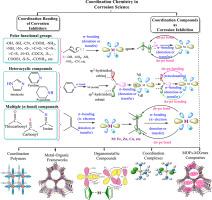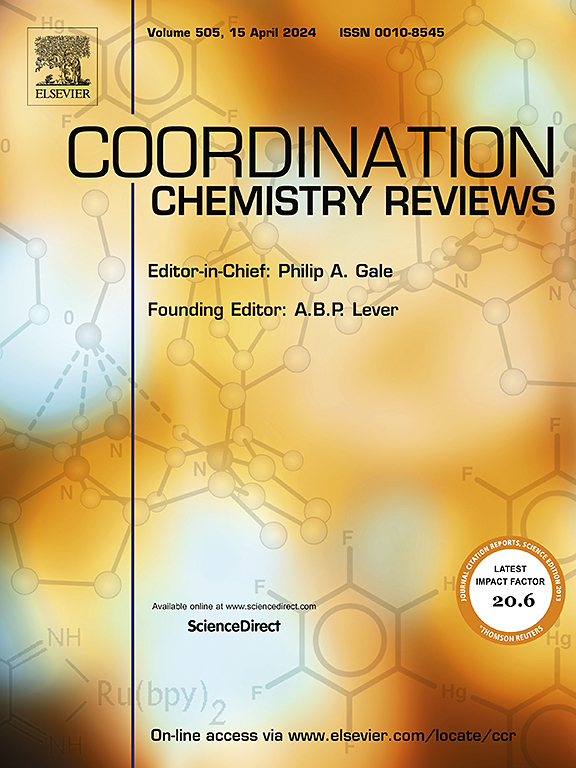Coordination chemistry in corrosion science and engineering: Role of coordination bonding and coordination materials
IF 23.5
1区 化学
Q1 CHEMISTRY, INORGANIC & NUCLEAR
引用次数: 0
Abstract
Coordination chemistry plays a significant role in corrosion science by clarifying the mechanics of interactions between inhibitor molecules and metal surfaces and using coordination compounds as effective corrosion inhibitors. The conventional corrosion inhibitors use their heteroatoms (N, O, S, and P) and electron-rich polar functional groups to coordinate with the metal surface. The polar substituents also influence the coordination and bonding efficiency of entire inhibitor molecules through resonance and inductive effects, which affect the electron density at the coordination site or sites. This review comprehensively illustrates the contribution of coordination chemistry principles and theories in corrosion inhibitors' adsorption and bonding. Numerous coordination materials, including MOFs (metal-organic frameworks), OMCs (organometallic compounds), CPs (coordination polymers), and their derivatives and composites, have emerged as next-generation corrosion inhibitors. The article discusses the advantages of coordination materials, including high surface area, adequate coverage, and self-healing potential, as alternatives to toxic corrosion inhibitors. It highlights the corrosion inhibition potential of emerging materials like MOF-MXenes composites and their self-healing properties, emphasizing the importance of coordination chemistry in developing sustainable corrosion inhibitors. This also underscores the growing relevance of coordination chemistry in developing sustainable, high-performance corrosion inhibitors tailored for modern industrial demands.

腐蚀科学与工程中的配位化学:配位键和配位材料的作用
配位化学通过阐明缓蚀剂分子与金属表面相互作用的机理,并利用配位化合物作为有效的缓蚀剂,在腐蚀科学中发挥着重要作用。传统的缓蚀剂利用其杂原子(N、O、S和P)和富电子极性官能团与金属表面配位。极性取代基还通过共振和感应效应影响整个抑制剂分子的配位和成键效率,从而影响配位位点上的电子密度。本文综述了配位化学原理和理论在缓蚀剂吸附和键合中的作用。许多配位材料,包括MOFs(金属有机框架)、OMCs(有机金属化合物)、CPs(配位聚合物)及其衍生物和复合材料,已经成为下一代缓蚀剂。本文讨论了配位材料的优点,包括高表面积,足够的覆盖和自修复潜力,作为有毒腐蚀抑制剂的替代品。强调了MOF-MXenes复合材料等新兴材料的缓蚀潜力及其自愈性能,强调了配位化学在开发可持续缓蚀剂中的重要性。这也强调了配位化学在开发可持续的高性能缓蚀剂方面日益增长的相关性,以满足现代工业需求。
本文章由计算机程序翻译,如有差异,请以英文原文为准。
求助全文
约1分钟内获得全文
求助全文
来源期刊

Coordination Chemistry Reviews
化学-无机化学与核化学
CiteScore
34.30
自引率
5.30%
发文量
457
审稿时长
54 days
期刊介绍:
Coordination Chemistry Reviews offers rapid publication of review articles on current and significant topics in coordination chemistry, encompassing organometallic, supramolecular, theoretical, and bioinorganic chemistry. It also covers catalysis, materials chemistry, and metal-organic frameworks from a coordination chemistry perspective. Reviews summarize recent developments or discuss specific techniques, welcoming contributions from both established and emerging researchers.
The journal releases special issues on timely subjects, including those featuring contributions from specific regions or conferences. Occasional full-length book articles are also featured. Additionally, special volumes cover annual reviews of main group chemistry, transition metal group chemistry, and organometallic chemistry. These comprehensive reviews are vital resources for those engaged in coordination chemistry, further establishing Coordination Chemistry Reviews as a hub for insightful surveys in inorganic and physical inorganic chemistry.
 求助内容:
求助内容: 应助结果提醒方式:
应助结果提醒方式:


